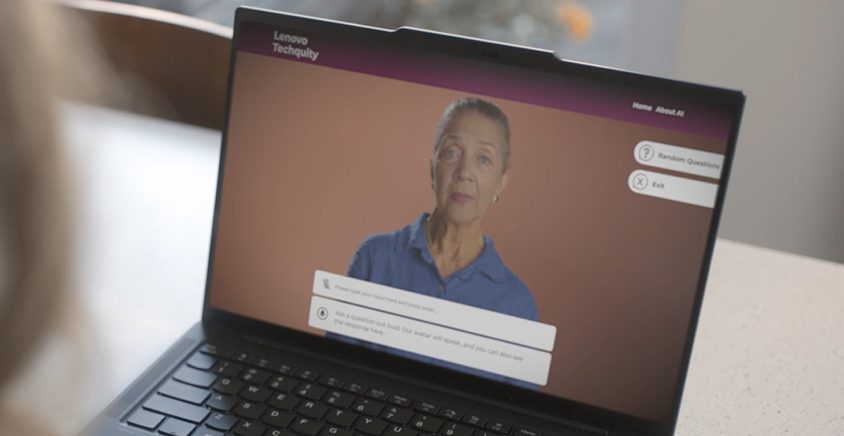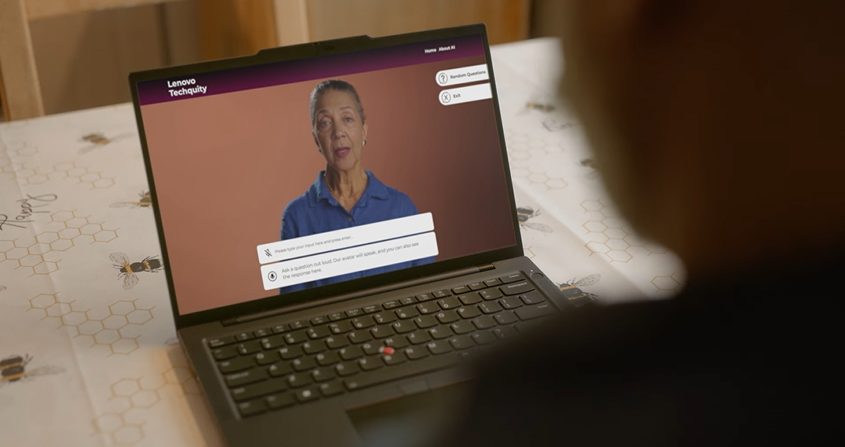MANILA, Philippines – Alzheimer’s Intelligence project demonstrates how smarter AI can empower people and give different communities a voice around future innovation
Imagine living with Alzheimer’s and having a lifelike AI companion, based on real experiences, available at any hour to offer compassionate support. At Lenovo Tech World on October 15, Lenovo, in collaboration with Innovations in Dementia, launched Alzheimer’s Intelligence—a groundbreaking AI avatar that provides real-time support for people with dementia. This project brings “Liv,” a photorealistic 3D avatar built with advanced AI, designed to address the unique needs of people navigating dementia, offering an accessible and intuitive source of guidance and understanding.
“Globally there are around 55 million people living with dementia, and that number is expected to reach 139 million by 2050,” said Dr. David Llewellyn, Professor of Clinical Epidemiology and Digital Health at the University of Exeter. “The AI advancements in Lenovo’s ‘Alzheimer’s Intelligence’ initiative demonstrate how technology has the potential to enhance human interaction, offering a valuable tool to support individuals living with dementia, both in the present and future.”
The AI avatar based on lived experiences
In this first-of-its-kind application, Lenovo has pioneered AI for dementia support, drawing on a vast range of real-life insights to create a conversational 3D avatar. This AI integrates advice from hundreds of people who are living with dementia, allowing users to converse naturally and obtain relevant, empathetic guidance. Whether discussing daily challenges or sharing insights on navigating the condition with family, this avatar connects users to a source of support that feels human.
“With recent and ever-growing advancements in AI, we must harness this technology purposefully and responsibly for communities that may be overlooked by innovative technology,” said Doug Fisher, Chief Security and AI Officer at Lenovo. “This is part of our commitment to delivering Smarter AI for All—developing and deploying technology that can empower everyone at every scale.”
An AI avatar created from real faces and voices
The avatar “Liv” represents a composite built from 10 people with dementia and Alzheimer’s. Generative AI technologies expanded this composite, creating thousands of expressions and angles, later synthesized into Liv’s persona. A unique language model was crafted to provide Liv’s responses, using sources like Innovations in Dementia’s Dementia Diaries project and panel interviews. Responses are designed to adapt based on sentiment analysis, with facial expressions mirroring the tone of the reply. Advanced visual AI enables real-time speech syncing with Liv’s expressions for a more lifelike interaction.
Alzheimer’s Intelligence was designed with accessibility in mind
For those newly diagnosed, Alzheimer’s Intelligence offers answers to common questions only someone with lived experience might understand, from discussing their diagnosis to managing new routines. Importantly, this avatar does not replace human contact but offers a resource that understands the unique emotional and practical challenges faced by those with dementia. It’s an accessible tool, requiring minimal tech experience and designed to be a familiar, supportive presence.
A controlled trial environment ensures responsible implementation
Currently, Alzheimer’s Intelligence is being trialed in a secure, controlled setting. Guided by input from researchers, caregivers, and those living with dementia, this trial aims to refine the avatar experience for a future public release. Lenovo utilized its advanced devices and services in collaboration with Kaleida AI, employing ThinkStation P7 servers, ThinkPad T14s laptops, and a range of Lenovo monitors to make this concept a reality.
“When people are first diagnosed with dementia, they can feel lost, with so many questions about what is happening. This AI doesn’t replace human contact but what it does do is offer a knowledgeable and compassionate source of assurance and advice based directly on the experiences and wisdom of other people with dementia,” said Steve Milton, Director, Innovations in Dementia.
Empowering people with dementia to share their voices
Innovations in Dementia works to create an open dialogue about the experiences of those with dementia, helping them feel empowered. The NGO promotes the idea that dementia, though life-changing, does not end life. This aligns with Lenovo’s mission to develop tools that resonate with diverse communities, using AI thoughtfully to support people at every stage of life. Doug Fisher highlighted the importance of giving all communities a say in future technology development, ensuring innovations like Alzheimer’s Intelligence reflect the voices of those who need it most.
Focus group participants reflect on the impact of real stories in AI
Gail Gregory and Ahmad Krayem, both living with dementia, emphasized the importance of real-life input in the avatar’s creation: “People with dementia are the experts. You can’t just grab things from a textbook because it’s not real. It must be real. And the more realistic it is, the more relatable it is,” Gail stated. Ahmad added, “A doctor can tell you what medication to take, but only people living with dementia can explain what they’re truly going through.”
Alzheimer’s Intelligence is a proof-of-concept tool and is not publicly available, but those interested in learning more can reach out to Innovations in Dementia (UK) or the Alzheimer’s Association (US).

Examples of interactions with the avatar
Q: I keep forgetting to take my pills. How can I remember?
A: It’s quite common to forget things like taking medication. Try setting a routine, like taking your pills with a meal or at the same time each day. You could also try setting an alarm on your phone or using a pill organizer.
Q: How do I talk about my diagnosis with friends and family?
A: Sharing your diagnosis with friends and family can be daunting but can also help with support. Start by explaining how you feel and what you’ve learned about the condition. Encourage questions, as this may help them understand. It’s okay to be open about any fears or concerns.
FAQs
Q: What is Lenovo’s Alzheimer’s Intelligence project?
A: It’s a photorealistic AI avatar designed to offer real-time support and advice for people living with Alzheimer’s and dementia.
Q: How does the AI avatar “Liv” work?
A: “Liv” uses speech-to-text input and responds with advice sourced from real-life experiences, enhanced with facial expressions and emotional analysis to feel conversational.
Q: Who developed the Alzheimer’s Intelligence avatar?
A: Lenovo, in collaboration with Innovations in Dementia and AI developers at Kaleida.
Q: How accurate is the advice given by the avatar?
A: The advice is based on real-life experiences and curated by experts, but it does not provide medical recommendations.
Q: Can I use the Alzheimer’s Intelligence avatar today?
A: Currently, the avatar is available only in trial settings but may become more widely accessible in the future.


